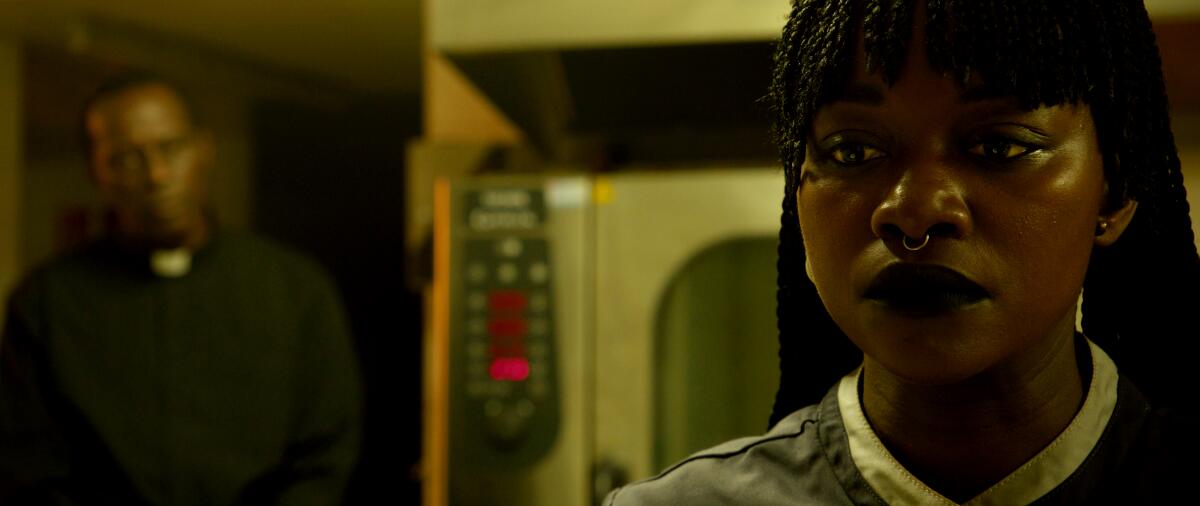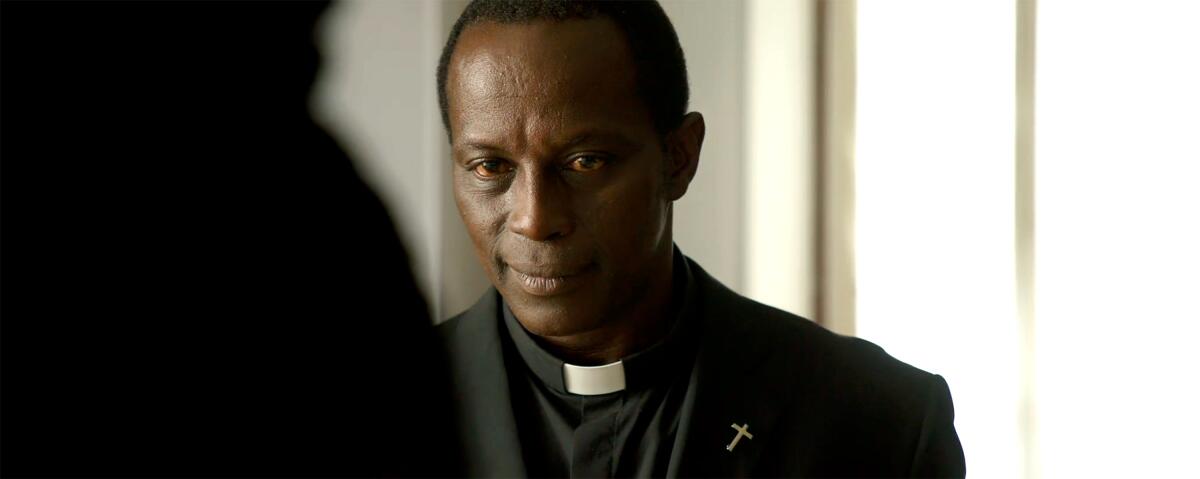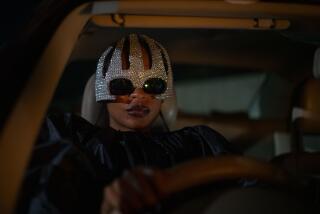Psychological horror ‘Our Father, the Devil’ conjures a specter in unlikely garb

- Share via
We’re in a golden age of movies about the immigrant experience, even as the tales themselves aren’t shiny and prosperous. Rather, filmmakers with roots in these communities are leaving behind well-trodden narratives of inspiring pluck and shifting to stories with harder, darker concerns, exploring that unsettled state of belonging to two worlds, or, perhaps, neither.
Cameroonian American filmmaker Ellie Foumbi’s remarkably assured feature debut, “Our Father, the Devil,” is more proof of this invigorating cinema current: a smart, chilling, and moody thriller set in a quaint French town, where the ghosts of an African immigrant’s traumatic past pay an unnerving, unwanted and consequential visit.
At its center is a tough, vibrating lead performance from Babetida Sadjo, and surrounding her is an air of moral peril and swirling rage thick enough to be cut with a knife (which occasionally it is). The film was also a surprise nominee for best feature at the Independent Spirit Awards earlier this year, and now, with distance from its more well-known competitors — including “Tár” and eventual winner “Everything Everywhere All at Once” — it can now be appreciated by moviegoers for the wise inclusion that it was.
Sadjo plays Marie, a solitary figure living in sleepy, mountain-ringed Luchon, where she’s a French-trained head chef at a boutique retirement home. One of the residents, Jeanne (Martine Amisse), is also the woman who trained her, and it’s a sign of Marie’s dutiful assimilation into this world that Jeanne — when pestered by a visiting grandson about his inheritance — instead gifts a treasured family cabin to her favorite ex-student. There’s a flip side to that weighted gesture of acceptance, however, when an underling of Algerian descent adds spices to a roux that Marie calls “bland,” earning a reprimand. Her thinking is clear: If there’s a recipe for fitting in, deviating from it is imperiling it.

Marie’s carefully protected existence is upended, however, when she arrives at work one day to find the staff and residents listening intently to the dulcet-toned, humbled ministrations of their new visiting priest, Father Patrick (Souléymane Sy Savané). Instantly stricken, Marie is convinced he’s the long-thought-dead monster known as “the Oracle” from her harrowing, death-ridden childhood in Guinea, but tells no one, not even her nurse friend Nadia (Jennifer Tchiakpe). Later, in a nail-bitingly charged moment between kindly Father Patrick and a coiled Marie in her kitchen — with Foumbi’s and cinematographer Tinx Chan’s widescreen framing (among the year’s best) masterfully conveying her unacknowledged terror in a tight space — she takes matters into her own hands.
The taut vengeance scenario that follows will remind some of playwright Ariel Dorfman’s post-totalitarianism psychodrama “Death and the Maiden” (filmed in 1994), in which a regime survivor confronts the doctor she believes was her torturer in captivity. But in Foumbi’s variation, the swirl of guilt, identity and escape is much thornier, wrapped up as it is in not merely the specific hell of dissociation from past horrors, but also the ambiguous cloak of redemption that religion offers.
Foumbi shrewdly keeps alive just long enough the question of whether Patrick is who he says he is (which Sy Savané handles perfectly) that the reverberations in Marie — her past and present now side by side — become a fight for her very body and soul. Sadjo’s portrayal captures all of that, too, from the hurt and rage in her eyes to the movement that suggests a woman submerged, fearful of herself. Even the possibility of romance with a hot, flirtatious bartender (Franck Saurel) is laden with the potential for either healing or disintegration.
“Our Father, the Devil” is the type of movie for which a satisfying ending is less about tidy resolution than potent insight, and in that respect, Foumbi delivers something befitting her grueling, clenched character study: a stark choice between demons and, if not angels, then a space where, as with so many emigrating from suffering, she can start over again.
'Our Father, the Devil'
In French and Mandinka, with English subtitles
Not rated
Running time: 1 hour, 48 minutes
Playing: Laemmle Royal, West Los Angeles
More to Read
Only good movies
Get the Indie Focus newsletter, Mark Olsen's weekly guide to the world of cinema.
You may occasionally receive promotional content from the Los Angeles Times.










